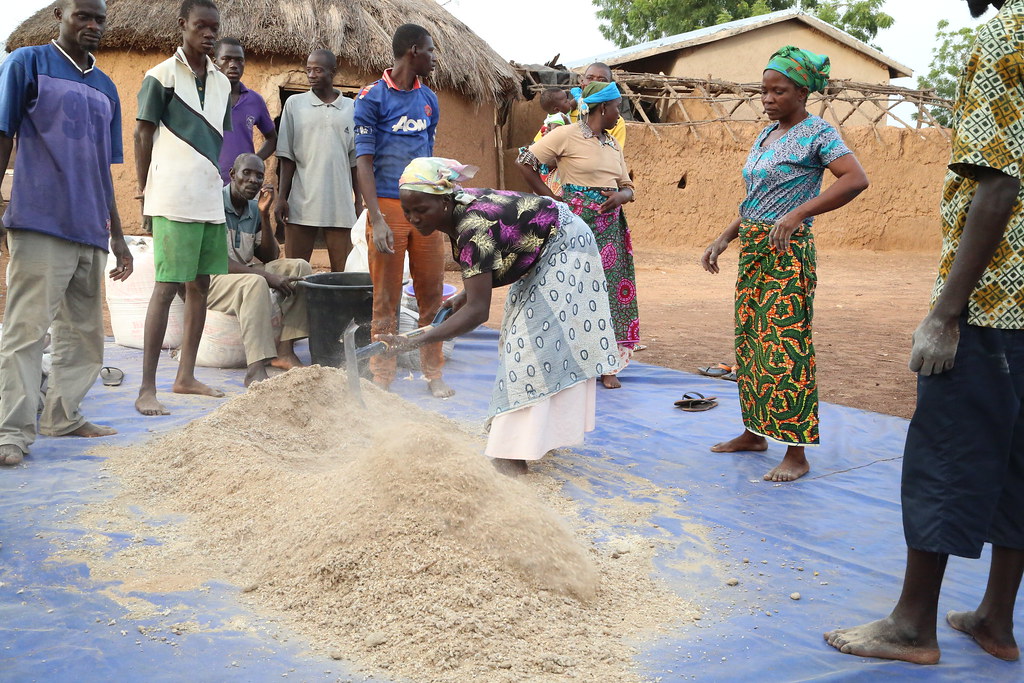‘The woman has no right to sell livestock’— challenging gender norms for transformative interventions in Ghana
By Kipo Jimah and Gundula Fischer (IITA)
One early afternoon in September 2020, we gathered under a tree with a group of smallholder farmers and other stakeholders from the Tibali Community in Northern Ghana. Livestock keepers, feed and food vendors, animal health providers, traders, butchers, and feed trough manufacturers working in the area were meeting with us (researchers in the Africa RISING program) because we wanted to know from them the role men and women play in the bustling small ruminants value chain in their region. Ultimately, we expected to learn how to improve the small ruminants value chain and enhance its inclusiveness.
After the formalities of starting the meeting, we asked them about communal gender roles in general and specifically in the small ruminants value chain. We also asked about the level of involvement of household members in selling small ruminants. Of the various answers that were shared on the role household members play, the most memorable was by a woman livestock keeper who offered a perspective that summed up what appeared to be accepted by a majority of the participants – considering the approving nods she got when she spoke.
‘For us Dagombas, it is forbidden. We disapprove of women selling any livestock. Even if you own them and live in your own house when you want to sell, you have to give it to a man to sell it for you,’ she said.
Her comments forebode the findings of our research on this subject in Ghana between September 2020 and December 2021.
We analysed data from eight focus group discussions, 10 key informant interviews, and 58 questionnaires, all collected from five villages in the Duko, Tibali, and Tignoli communities in northern Ghana. Using this mixed-methods approach, we explored the gender norms that underpin inequitable relations within households along small ruminant value chains and between different nodes – production, marketing, and distribution (transporting). In Ghana, sheep and goat meat production largely occurs in the Northern region, where medium- and low-endowed farmers practice small ruminant husbandry as a vital livelihood diversification strategy. Both men and women are visible actors in the production node of small ruminants’ value chains. But women are not visible in the distribution and marketing nodes.
Findings from the study show that
- Both men and women are involved in the small ruminant production node. Yet women’s ownership of small ruminants is blurred. A woman cannot say she owns small ruminants. ‘It is forbidden,’ said a woman small ruminant keeper.
- Women are not visible in the marketing and transporting node.
- Women are most likely not involved in decisions regarding the selling of small ruminants. A man small ruminant keeper said ‘the selling decision is with your wife, but if your wives’ children are of age, then their mothers’ hands is not inside! It is you (the man) and your children who will make the decisions.’
The limited participation of women beyond the production node has a negative effect on their social standing in the household and community at large, as ownership of livestock is a key indicator in wealth ranking. It also limits women’s control of the benefits from small ruminants as men make decisions about the use of income from small ruminants.
Gender norms are a root cause of the limited involvement of women beyond the production node. Our sample, including both small ruminant keepers and actors, largely agreed that ‘it is disrespectful for a married woman to say that she owns livestock’ (Figure 1). And they both disagreed that ‘it is acceptable for a married woman to go to the market to sell livestock,’ (Figure 2).
Based on these findings we recommend emphasizing gender-transformative community conversations and multistakeholder dialogues on equitable institutions. Enhancing inclusivity in the value chain will require all-inclusive community conversations about changes in gender relations (e.g. division of labour), changes in decision-making in households on handling and consumption of animal-source foods, ownership, and control of livestock and income, as well as increased harmony, trust, and collaboration in households. If sustainable, transformative change is to be achieved, all the stakeholders surveyed in this study will have a crucial part to play.
This study was implemented under the United States Agency for International Development (USAID)-funded Africa Research in Sustainable Intensification for the Next Generation (Africa RISING) Program. The broader activity goal is to assess women and youth participation in maize and small ruminant value chains within the cereal-root crop mixed farming systems of Northern Ghana. Some aspects of this work will be carried over for follow-up in the soon-to-be inaugurated One CGIAR Initiative on Sustainable Intensification of Mixed Farming Systems (SI-MFS). The results will be published in a forthcoming study report and a journal article on gender-transformative value chain interventions recommendations.
Link to presentation: https://www.slideshare.net/africa-rising/k-jimah







